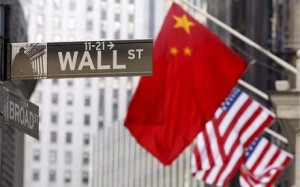Old friend columnist Joseph Alsop once told me of arriving in China with a clanking sword he had hassled across the Pacific, given him by his cousin, FDR, along with an instant “Inside-the-Beltway” Navy commission.
President Roosevelt sent him immediately after Pearl Harbor to Chungking as “political adviser” to Claire Lee Chenault and his volunteer Flying Tigers. Assiduously building his brief, Joe got horrendous detail from the Chinese Nationalist refugee capital’s best informed correspondent about the outrageous corruption of Generalissimo Chiang Kai Shek’s Kuomintang. When Joe asked our mutual friend why he wasn’t writing it for his newspaper, the old China hand smiled, knowingly, saying: “Nobody tells on China.”

America’s romance and intimacy — and conflicts — with China are as old as The Republic. Yale’s original endowment reputedly came from a cargo of Indian opium shipped to China. Coolies helped build the transcontinental railroads, then got expelled or denied citizenship. Long before “multiculturalism”, U.S. boonies had their Chinese restaurants. For those old enough to remember, local Chinese handwash laundries were a landmark in every neighborhood.
But exotic legend often obscured mundane reality. Most, if not the majority of American China academics, were for decades apologists for Mao’s atrocities, vilifying their few vocal critical colleagues. Alas! some, without confession much less apology, still hold high places in American Asian NGOs. Even now temerity permits tomes about Mao’s “secret” famines. [A Hong Kong friend recalls: “Only three and a half million here were trying desperately to get food packets to Mainland relatives.”]
Now history repeats as stories begin to proliferate about the coming Chinese economic crisis. A minority of us have watched, stupefied, over the years as writer after economist without caveat spelled out glories of the Chinese “model”.
Hold up! You mean there hasn’t been incredible Chinese economic development? Yes, of course, there has. And no one who has lived with the Chinese entrepreneurial spirit wherever it flowered among Overseas Chinese or in Taiwan — or recalls pre-World War II’s coastal cities’ prosperity even under Japanese assault — were surprised when it took off after Maximum Leader Deng Xiaoping opened floodgates to foreign capital and technology.
But those Shanghai office towers across the river in Pudong were already standing empty a decade ago — not that you would know from any contemporary reporting. Former Prime Minister Rhu Rongji publicly pleaded with provincial bureaucrats to stop fabricating figures because it made it impossible for him to know what was going on. Only a year ago provincial GDP figures didn’t jibe with the national totals.
But, never mind, our academics — and most of the financial media — kept right on, grinding out incredible gobbledygook about economics “with Chinese characteristics”, how its GDP make it No. 2 [despite subsistence living standards for the majority of its people], and how Chinese growth would save the world, etc., etc.
Now even The Financial Times, among the loudest indiscriminate propagandists for China straight-line projections, has taken a deep breath, predicting coming problems, perhaps even disaster.
Uh oh! The Chinese boom has depended on export markets now drying up in the U.S. and the EU. It has relied on unlimited infrastructure expansion but government “stimulus” is leading to inflation.
Virtually zero rural investment and protectionist trading are driving up food prices where most Chinese live. Banks’ newly created debt dumps are being used to lend to Party-favorites so there just might be a credit problem. The government is shifting to subsidized housing [but still beyond the reach of wage-earners] to deflate a real estate bubble, the only place “hot money” could go with government “planned” investment.
Oh yes, and it’s now “clear” Chinese growth isn’t going to “save” the world economy. In fact, some commodity-dependent economies are going to be in little trouble. Hello!
But there is always room for new wishful thinking: Beijing will use its depreciating dollar hoard [already backing local currency] to expand the “money stock” measured by meaningless M2 and M3Western econometrics. Or it will try to buy Western equities, scaring the wits out of security-minded politicians, or get at technologies [such as shale fracking] to reduce its growing imported energy. And, of course, Chinese planners will somehow manage a “soft landing”.
After almost every disaster — natural or man-made — there is the inevitable cry, “But why didn’t we see this coming; it was so obvious.”
Sol W. Sanders, (solsanders@cox.net), writes the ‘Follow the Money’ column for The Washington Times on the convergence of international politics, business and economics. He is also a contributing editor for WorldTribune.com and East-Asia-Intel.com.


You must be logged in to post a comment Login